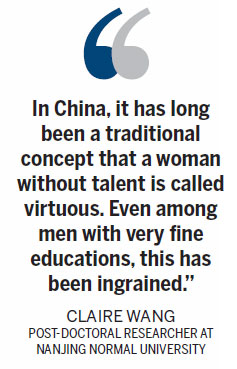Waiting for their half of the sky
Updated: 2014-02-14 09:34
By Yang Yang (China Daily)
|
|||||||||||
Risk of scorn

Although marriage is equally important for both men and women, it is the women who seem to get saddled with the weight of responsibility for tying the knot, and who risk societal scorn or pity if they do not, according to Li Sipan, another advocate for women, who works with New Media Women Network, a Guangzhou-based NGO. That sort of "social awareness" (some might call it social pressure) in defining the fundamental value of a woman has discouraged many women from pursuing their dreams of excellence in academia and the workplace, Li said.
Female students often can achieve better scores in qualifying examinations for advanced degree programs but are more likely to be rejected at the interview stage because professors, employees or even whole schools want males. The problem was illustrated in 2012 at Renmin University, which had reduced the college entrance test score standard for male students by 13 points in an effort to achieve equality of numbers with higher-scoring females in less-popular language programs. After intense criticism, the school dumped the policy in favor of equality. In 2013, only three male students were admitted out of 14 students.
From 2000 to 2012, female students represented 51.8 percent of the 1,007 top scorers in college entrance examinations around China, and the gap continues to widen. Some universities continue to maintain a double standard favoring males.
In August 2012, Lyu, the women's activist and lawyer Huang Yizhi asked the Ministry of Education to explain why sexual discrimination in university enrollment is allowed. The ministry sidestepped, saying that "it is in the interest of our country" to satisfy the need for professionals in certain fields.
That same month, four young women in Guangzhou shaved their heads to protest gender discrimination in enrollment and asked the ministry to be more specific. "Which special industries and positions or which universities and majors do you mean in terms of 'approving' the male-female enrollment rates set by some universities?" they asked. The ministry did not respond directly.
A report released in 2013 by another NGO - Women's Media Monitor Network - found that among the 112 top universities in China, 81 practiced gender discrimination, and 34 broke the rules set by the Ministry of Education, including new regulations released in May 2013: "Except majors of military affairs, national defense and public security in some special schools, unequal female-male enrollment rates are not allowed in institutions of higher education," the rule reads. Li said the schools were in violation of the Chinese Constitution and the Education Law, but nobody took any legal responsibility to push the matter.
Under the Education Law, Chinese citizens are supposed to enjoy equal opportunities in education regardless of ethnicity, race, sex, profession, financial situation or religious belief, and the law demands that schools and related executive departments of the government guarantee equal opportunities for female students, both in enrollment and in progressing to higher schools.
But when it comes to admission to graduate schools, female students continue to encounter discriminatory attitudes and stereotyping.
A micro blog in 2013 by Feng Gang, a male professor of sociology at Zhejiang University, noted that the three top graduate students seeking an advanced degree were female. "However, according to my experience, female students seldom dedicate themselves to scholarship," Feng wrote. "Since they have taken three out of the five places for graduate students, there are only two slots left for students who really want to do scholarship but have to take the examination. I am so worried about them."
Nothing new
Disparagement of female academics is nothing new. A popular joke in China says there are three kinds of human beings in the world: men, women and female doctoral candidates - the latter being a frigid, stern pedant with an oily face and greasy hair who cannot communicate properly, a sort of Amy Farrah Fowler on CBS's The Big Bang Theory.
But even women with more favorable physical attributes don't necessarily amass an army of adoring suitors. Stereotypes stick.
Claire Wang, 30, earned a PhD in chemistry from the University of Leeds in the United Kingdom and is now conducting postdoctoral research at Nanjing Normal University. Pictures of her were posted on Tianya Forum, along with an ad seeking a boyfriend whom she could introduce to her parents during Spring Festival. She became a minor sensation online.
Though she was hailed as a striking beauty by netizens, Wang's resume scared off plenty of candidates. An unscientific poll asked men whether they would marry such a woman. Of the more than 6,000 respondents, nearly a third (about 1,700) said no. The reason? "Too much pressure", according to a report by Nanjing newspaper Modern Express.
"In China, it has long been a traditional concept that a woman without talent is called virtuous. Even among men with very fine educations, this has been ingrained," Wang said. "They want to find a virtuous woman who will worship them and depend on them. A female doctor who has read a lot of books and mastered profound knowledge in a certain field may have a lot of thoughts beyond a man's control. What they don't get," she said, "is that doing doctoral study is simply work."
Wang was not surprised at the disparaging comments by Luo, the Guangdong CPPCC member, because she had met many other people who say virtually the same thing.
Related Stories
Quarter of Chinese women suffer domestic violence 2013-11-26 21:23
Women get their rightful place in society 2013-12-14 07:58
Xi stresses gender equality 2013-11-01 05:21
China strives to help left-behind women 2013-12-30 17:07
Today's Top News
4 die in Austrian train-car crash
China spends billions on rural education
Plan drafted for $36b undersea tunnel
Rural reform needs science input
Service gives hope to bereaved parents
China's IPOs raise nearly $5 billion
Policy may alter migration route
US envoy meets India's Modi
Hot Topics
Lunar probe , China growth forecasts, Emission rules get tougher, China seen through 'colored lens', International board,
Editor's Picks

|

|

|

|

|

|





